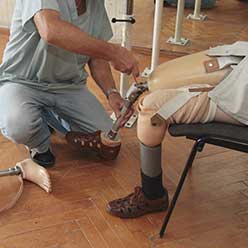Our law firm has been successful for over 50 years because we take on cases that we know we can win. We prepare thoroughly, do our research, and put in the work necessary to get true justice for our clients. When an insurance company tries to undervalue our client’s compensation, we prepare our legal team and ready your case for trial. We have the determination and the resources to see your case through to the end, and we are not afraid to take on construction companies or big insurance.
Our clients rely on us to get them the compensation they deserve, and we take that responsibility very seriously. If we lose a case, it is not just a financial setback for us, but a huge disappointment for our client who is struggling to recover from their construction accident. We believe that justice must prevail, and that is why we continue to win for our clients.
 We know that construction accidents can cause serious injuries and even death. Lawyers who represent injured people in these types of cases need to be knowledgeable about the unique laws and regulations that apply to construction accidents. They also need to be able to navigate the complex laws of workers' compensation. Our attorneys have the experience and knowledge necessary to get our clients the best possible outcome in their cases. We understand that this is a difficult time for our clients and we will do everything we can to help them get the compensation they deserve.
We know that construction accidents can cause serious injuries and even death. Lawyers who represent injured people in these types of cases need to be knowledgeable about the unique laws and regulations that apply to construction accidents. They also need to be able to navigate the complex laws of workers' compensation. Our attorneys have the experience and knowledge necessary to get our clients the best possible outcome in their cases. We understand that this is a difficult time for our clients and we will do everything we can to help them get the compensation they deserve.
Attorney Robert Miller has extensive experience with construction accident cases, representing clients in almost every court in Pennsylvania. His successes have earned him the rating of Top Attorney by Super Lawyers™ every year since 2018, and he has won many multimillion-dollar verdicts for his clients, including a landmark $227M verdict in a wrongful death case.
We believe that everyone should have access to justice, regardless of their financial situation. That's why we offer to take construction accident cases on a contingency basis, which means that we don't charge any fees unless we win your case. We understand that many people are reluctant to pursue legal action because they're worried about the cost of hiring a construction accident lawyer.
By taking cases on a contingency basis, we can help more people in Philadelphia get justice for their injuries and help give them the peace to start over again. On the other hand, working on a contingency basis gives us a strong incentive to win every case we take on. If we don’t obtain a favorable outcome for our clients, we don’t get paid. More importantly, taking cases on a contingency basis allows us to build trust and rapport with our clients from the very first day we meet. We are not interested in merely settling cases quickly; we are interested in getting the best possible results for our clients.
Construction workers need to consult with an experienced attorney after an accident to discuss all of their legal options. Contact The Cochran Firm in Philadelphia to discuss your case with a construction accident attorney today at 800-969-4400.
If you’ve been the victim of a construction accident, our attorneys at The Cochran Firm in Philadelphia can help build a firm foundation for your case right away.
Your consultation is free, and you won’t owe anything unless we recover damages for you. Call The Cochran Firm in Philadelphia now at 800-969-4400 to get started on a path for true justice.
In most cases, a construction worker who is injured in a workplace accident cannot take legal action for personal injury through the civil court system because of the Pennsylvania’s Workers’ Compensation Act, which has been in place since 1915. Typically, an injured construction worker's only remedy is through workers' compensation, which provides no-fault insurance for injured workers.
There is an exception, however, for injuries that result from an employer's "intentional wrong" under the virtual certainty rule. In order to sue outside of the workers’ compensation system in Pennsylvania, an injured construction worker must show that the employer’s conduct went beyond a deliberate intent to injure; they must, instead, demonstrate that there was a substantial certainty that injury or death will result.
In other words, an intentional wrong must amount to a virtual certainty that bodily injury or death will result. A probability, or knowledge that such injury or death "could" result, is insufficient. Even if the evidence suggests that the construction company was negligent or even grossly negligent, that is not enough to bypass the workers’ compensation remedy and sue the employer for personal injury in civil court.
If you are a worker who has been hurt in a construction accident and you file a lawsuit to sue your employer for damages, it is almost guaranteed that the attorneys for the employer and their insurance company will file a motion for summary judgment opposing your lawsuit. These employer defense attorneys will argue that you are not allowed to sue in civil court because the Pennsylvania legislature intended your recourse for damages to be through the exclusive remedy of workers’ compensation insurance.
However, when an injured employee sues an employer for a construction accident, and the employer moves for summary judgment based on the workers' compensation bar, the trial court will consider the following questions:
If the answer is yes, then the trial court must then determine:
 Thus, if a jury could conclude that the injured employee's allegations would meet the virtual certainty rule, then the employer's motion for summary judgment should be denied and the injured employee’s lawsuit should go forward.
Thus, if a jury could conclude that the injured employee's allegations would meet the virtual certainty rule, then the employer's motion for summary judgment should be denied and the injured employee’s lawsuit should go forward.
On the other hand, if the injured employee cannot show that there was a substantial certainty that injury or death will result from the employer’s intentional wrong, then the employer’s motion will be granted. If the employer’s motion is granted, then the injured employee may have to pursue a claim through workers’ compensation if the decision is not appealed.
What is a third-party lawsuit? This type of lawsuit is filed against a party other than your employer. The following are some examples of when an injured worker can sue a third party in a construction accident:
Speaking with a Pennsylvania construction accident attorney before taking any legal action is important. The Cochran Firm in Philadelphia can help you with the next steps. Contact us today at 800-969-4400.
Get a free consultation
Pennsylvania law defines personal injury as an injury resulting in death, serious impairment of a body function, permanent serious disfigurement, physical damages, mental damages, or an aggravation of existing injuries. See 18 Pa. Stat. § 11.103, 75 Pa. C.S. § 1702. Pregnancy can also be a personal injury when it is the result of a crime. 18 Pa.C.S.A. § 1106(h).
When someone submits or files a claim for personal injuries, they are seeking money for an injury or harm caused by another person, product, animal, or entity. Typically, personal injury claims are based on negligence, intentional torts, strict liability, criminal acts, or defamation.
Many factors determine the worth and value of a personal injury claim, and every case is different. A judge, jury, or insurance company may all evaluate a claim differently, but they will usually base their decision on the following details:
According to the statute of limitations in Pennsylvania, you generally need to file your personal injury case within two years of the date of the injury or the date when the injury becomes known; however, there are some distinctions to this rule if the victim is a minor or the victim dies and the family wishes to file a wrongful death or survivorship claim.
If a defendant asserts that you are partially at fault for your injuries, the defendant must show that you failed to use proper care for your own safety. If a jury assigns a percentage of fault to your personal injury claim, your recovery will be reduced in proportion to the amount of negligence attributed to you. For example, a person is struck by a car while jaywalking. The defendant alleges the jaywalker’s negligence is to blame for some of their injuries. A jury finds the jaywalker is 40 percent at fault. The judge then reduces the jaywalker’s compensation by 40 percent of the total award amount. See 42 Pa. C.S. § 7102.
According to Pennsylvania Code 31 Pa. Code § 146.9, if an insurance company wishes to reduce or deny a personal injury claim based on comparative negligence, then the insurance company must fully disclose to the claimant the reason for the reduced offer or denial based on facts or the law. Moreover, insurance companies may not use comparative negligence unfairly or use comparative negligence to force claimants to file a lawsuit in order to get the compensation they were already entitled to receive. This type of insurance company bullying or manipulation will often result in attorneys filing bad faith claims against insurance companies.